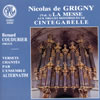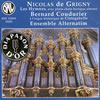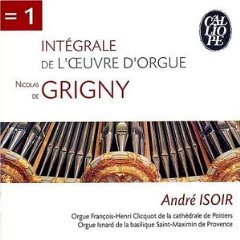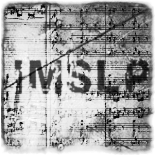Nicolas De Grigny (1672-1703) is not among the most famous composers. Nevertheless, he deserves some attention. Just as his earlier contemporary Henry Purcell (1659-1695), De Grigny died at young age. In contradiction to Purcell, he only left a small amount of music. In 1699 De Grigny published his Premier livre d’orgue. According to the title he had plans to publish more organ books, but unfortunately he never was able to do that. He died in 1703. In later printings of the book, the word “Premier” was omitted from the title.
Nicolas was born in Reims, moved to Paris, where he became organist of the Saint-Denis, and moved back to Reims, where he was appointed organist of the cathedral. Not so many details about his life are known.
This one organ book De Grigny left us, is a valuable source of music, as is shown by the fact that both Johann Sebastian Bach and Johann Gottfried Walther copied the entire book by hand. One must have good reasons to do such a laborious job. Apparently they wanted to learn form De Grigny’s music. Both copies have been preserved.
The book contains organ movements for a mass and five hymns. All the pieces were meant to be performed in alternatim style: the choir and the organ alternately performed a verse.
A musical form in which De Grigny showed himself a master was the fugue. His fugues have five voices: two voices for the right hand, two for the left hand in another timbre, and one for the pedal. Listen to the opening of the fugue from the hymn “Pange Lingua”: (mp3 – source). All five voices are present in this fragment. If we number the voices from high to low, the entrance of the voices is in the order: 3-2-4-5-1. The highest voice enters last; this is right before the end of the fragment. To construct such a five-voice contrapuntal fabric, one need quite some compositional skills. No wonder Bach was interested.
Let’s go back to Bach’s copy. We may suppose that De Grigny’s music had some influence on Bach. An example of this is the parallel between De Grigny’s fugue from the Gloria and the Fantasia in c minor (BWV 562) from Bach. Listen to the opening measures of both pieces: De Grigny’s fugue: (mp3 – source) and Bach’s Fantasia: (mp3 – source).
Recommended cd’s


Recommended sheet music

Details: Sheet Music Plus or Petrucci Library (free pdf)



